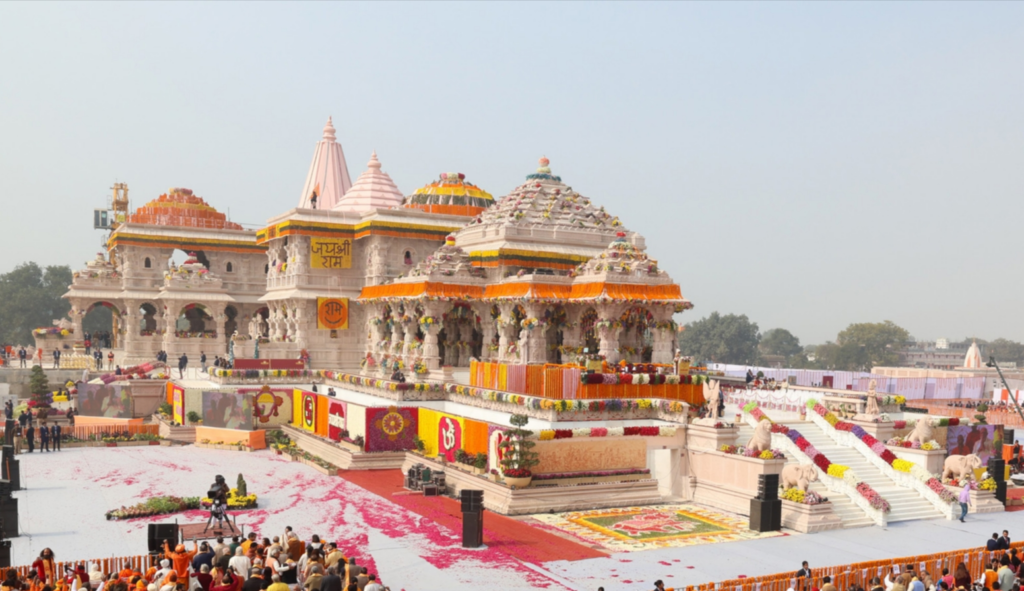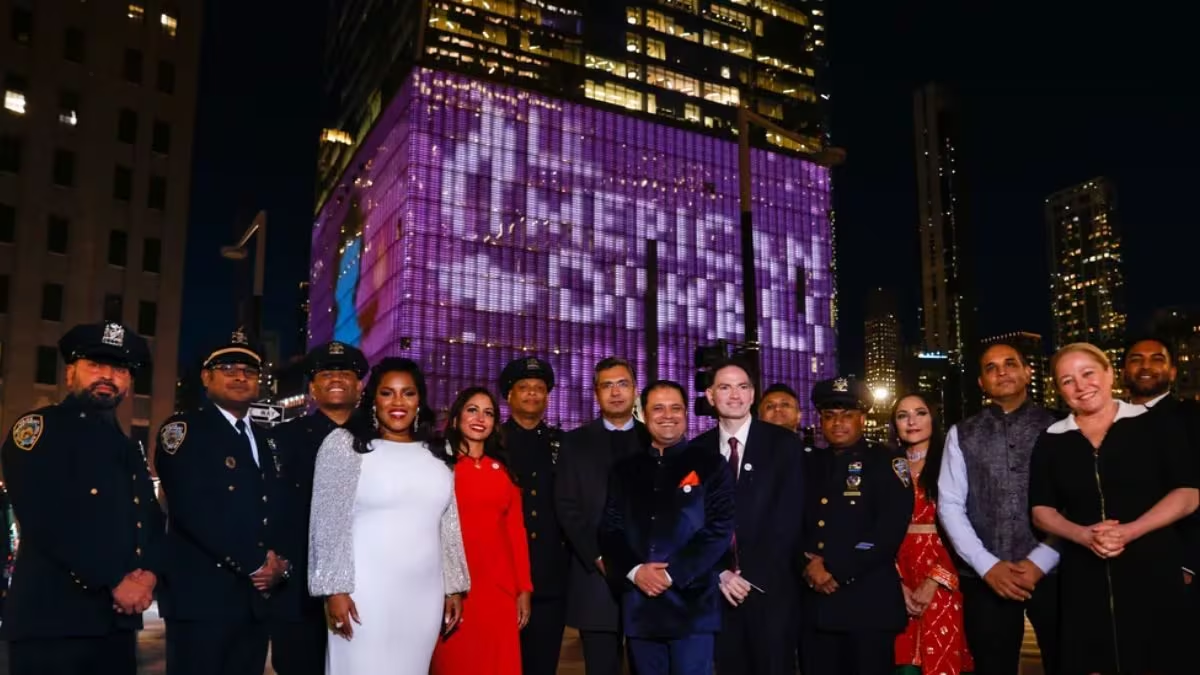The Diwali season brought special significance to New York City this year as the One World Trade Center, the tallest building in the United States, illuminated the city’s skyline in radiant colors to celebrate the festival of lights.
The celebration symbolized unity, inclusion, and a recognition of cultural diversity, as Diwali holds a cherished place in Indian culture and, increasingly, in the multicultural mosaic of the U.S.
This spectacular light show is part of a broader trend of acknowledging the cultural importance of Diwali in America, and it came with a set of new milestones that further highlighted this significant moment.
Illuminating the Skyline: One World Trade Center and Diwali
The lights adorning the One World Trade Center in New York weren’t just festive decorations; they symbolized a growing appreciation of Diwali and its significance. Diwali, often referred to as the “festival of lights,” celebrates the triumph of light over darkness, good over evil, and knowledge over ignorance.
For Indian communities and those celebrating around the world, it’s a time for family gatherings, lighting diyas (oil lamps), and sharing joyous moments. This year, New York’s tribute with the One World Trade Center joining in the celebrations became a powerful testament to the holiday’s growing recognition.
The Indian Consulate General in New York expressed pride in the event, sharing on X (formerly Twitter), “Shubharambh of Diwali with the tallest building in the USA, One World Trade Center lighting up in radiant colors! Here’s to a festival of lights that shines across the globe!”
🪔 Shubharambh of Diwali with the tallest building in the USA, One World Trade Center @OneWTC lighting up in radiant colors!
— India in New York (@IndiainNewYork) October 30, 2024
Here's to a festival of lights that shines across the globe!@MEAIndia @IndianEmbassyUS @IndianDiplomacy @NYCMayor @GovKathyHochul @saef_usa pic.twitter.com/cVZHKbuEjO
Along with colorful illuminations, digital “diyas” (oil lamps) were displayed, casting a festive atmosphere that echoed through the city’s bustling streets. This show of cultural solidarity highlights how Diwali is increasingly celebrated in major urban areas across the U.S., reflecting the country’s cultural inclusivity.
Celebrations Beyond the Skyline: Diwali Across New York and the United States
As the skyline lit up, Diwali festivities resonated through many facets of American life. In a historic move, New York City’s public schools will close for Diwali, starting from this year, a decision that took years of advocacy from community leaders, elected officials, and local organizations.
This decision marks a significant step for the Diwali-observing community in the U.S., where school closures during Diwali recognize its significance as an integral part of the multicultural landscape.
Read : New York City Declares School Holiday for Diwali for the First Time
Dilip Chauhan, Deputy Commissioner of the New York Mayor’s Office for International Affairs, expressed the monumental nature of this decision. He emphasized the challenges overcome to institute such a holiday in a city with over one million students, attributing the success to the combined efforts of Mayor Eric Adams, community leaders, and advocates.
The announcement was a proud moment for many who had campaigned tirelessly for Diwali to receive the same recognition as other significant holidays.
This recognition isn’t limited to New York City alone. Over the past few years, various states, cities, and educational institutions across the U.S. have embraced Diwali celebrations.
From Diwali-themed lights at landmark locations like the Empire State Building to grand celebrations hosted in American cities, Diwali is now a symbol of cultural unity and respect across diverse American communities.
Such recognition also reflects the growing contributions of Indian Americans, who are influential in sectors such as business, technology, academia, and public service, adding another layer to the country’s multicultural identity.
A Diwali Celebration at the White House
The Diwali celebrations were further elevated when President Joe Biden hosted a grand event at the White House on October 28, 2024. This year’s gathering marked President Biden’s final Diwali celebration as U.S. President, adding to the emotional depth of the occasion.
Attended by over 600 Indian Americans, including Congressional representatives, senior officials, corporate executives, and community leaders from across the country, the event underscored the White House’s commitment to honoring cultural diversity and fostering inclusion.

The event at the White House celebrated not only Diwali’s significance but also the contributions of the Indian American community, which has become an influential demographic in U.S. politics and society.
The Biden administration has actively acknowledged the cultural heritage of communities such as the Indian American diaspora, reflecting an ongoing effort to promote inclusive celebrations at the highest levels of government.
During his remarks, President Biden noted the importance of Diwali as a symbol of hope and renewal, themes that resonate universally and bring together people of different faiths and backgrounds.
The Biden administration has previously celebrated Diwali with warmth and openness, inviting Indian American leaders to the White House and extending good wishes to all who celebrate.
This year’s event was both festive and poignant, as President Biden took a moment to acknowledge the accomplishments and contributions of Indian Americans, from fields of science and technology to arts and culture.
The celebration fostered a shared sense of joy and respect that transcends borders and cultural backgrounds, further strengthening the bond between the two nations.
In addition to the White House celebration, the U.S. Embassy in India also commemorated Diwali with cultural performances and festivities. U.S. Ambassador to India, Eric Garcetti, took to the stage in Delhi, performing a lively bhangra dance to “Tauba Tauba,” a popular song from the Bollywood movie Bad Newz. ‘
Garcetti’s embrace of Indian cultural traditions highlights the deep and vibrant connections that continue to grow between the people of India and the U.S.
Diwali in America: A Reflection of Cultural Harmony
As Diwali lights up buildings, schools, and official spaces across America, it is evident that the festival has grown beyond the borders of India to become a cherished celebration worldwide. New York City’s decision to close schools for Diwali and the lighting of the One World Trade Center are testaments to a broader recognition of cultural inclusivity in America.
These acts also reflect an evolution in the country’s approach to diversity—one that embraces and celebrates unique cultural expressions, strengthening social bonds.
The presence of Indian traditions in mainstream American celebrations reinforces the role of the Indian American community in shaping the country’s cultural identity. The growing acceptance of Diwali shows that American society increasingly values cultural understanding and respect, which are fundamental to fostering a peaceful and cohesive nation.
When large, influential cities like New York honor festivals such as Diwali, it sends a powerful message that multiculturalism is both celebrated and respected.

Diwali is not just a festival; it is a symbol of hope, love, and the pursuit of knowledge and wisdom. These ideals resonate universally, and when adopted by different cultures, they serve to deepen the connections among people from diverse backgrounds.
The warm response to Diwali festivities across the U.S., from government buildings to school holidays, illustrates a celebration that goes beyond cultural boundaries and brings together communities through shared values.
The lighting of the One World Trade Center for Diwali, the recognition of Diwali as a school holiday in New York City, and the Diwali celebration at the White House each signify the spirit of inclusivity that characterizes the American cultural landscape.
These celebrations not only honor the Indian American community but also serve as a reminder of the shared values that unite people from all walks of life. As Diwali continues to spread its light across America, it becomes a shining example of how cultural diversity enriches and strengthens societies.
Through these acts of celebration and recognition, Diwali becomes more than just a festival—it becomes a symbol of the harmonious blending of traditions, a festival that lights up hearts and minds across the globe.

